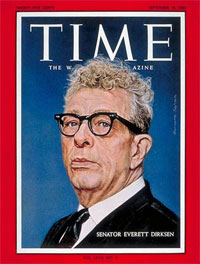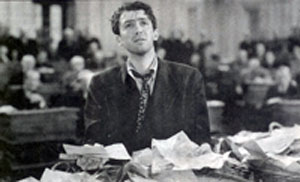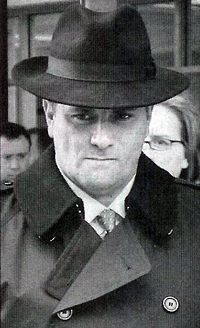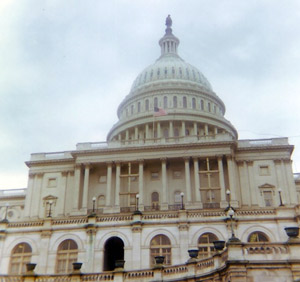
Everett Dirksen
(R-Ill.) was
elected
to the U.S. Senate in
1950 and
served until his death
in 1969,
for 11 of those years as minority
leader.
In 1972,
one
of the
Senate's buildings
was
renamed
the
Dirksen
Senate
Office
Building
in his
honor.

Academy of Motion Picture Arts and Sciences
The filibuster was immortalized in film by Jimmy Stewart in "Mr. Smith Goes to Washington."

Gerald Herbert, Associated Press
Lobbyist Jack Abramoff
playing himself
home
Most Corrupt Lawmaking
How Laws and Appointments Are Rammed Through Washington
By Robert C. Keating, Editor
"Power tends to corrupt; absolute power corrupts absolutely," said Lord Acton. With one party controlling the executive, legislative and judicial branches of government for six years, "we the people" remained fairly clueless as the rich and powerful got everything they wanted...behind our backs.
* * * * * * * * * * * * * * * * * * * * *
Bush's Law Exceptions
August 9. 2006, Los Angeles Times -- The American Bar Association approved a resolution condemning President Bush's practice of writing exceptions to legislation he signs into law.
Delegates at the ABA's annual meeting in Honolulu approved the resolution that objects to any president using bill-signing statements to dilute or change laws rather than using an outright veto.
Bush has written exceptions to about 800 legislative provisions, more than all previous presidents combined.
© 2006 Los Angeles Times
* * * * * * * * * * * * * * * * * * * * *
Acting by decree
When Bush's "Healthy Forests Initiative" met with widespread public skepticism for its give-aways to logging interests and when Congress adjourned in late 2002 without passing his legislation, Bush decided to act by decree, pushing parts of his plan through administratively.¹
* * * * * * * * * * * * * * * * * * * * *
Recess appointments
After Bush's controversial choice of anti-U.N. John Bolton for Ambassador to the U.N. was blocked for five months by Democratic lawmakers, he invoked his constitutional authority to fill the open job while Congress was in recess, instead of trying to resolve the deadlock with Senators who felt Bolton was unfit for the job.²
* * * * * * * * * * * * * * * * * * * * *
Rushing bills to vote without debate
To help ensure passage of controversial bills, the powerful House Rules Committee, contrary to traditional practices, routinely restricted floor debate and limited opportunities for Democratic-sponsored amendments during the first six years of the Bush administration. Sub-committee meetings were held in basement staff rooms with no numbers on the door, where Democrats couldn't find them. "In the process, democracy is being dismantled," Erica Rosenburg wrote in the Los Angeles Times.³
* * * * * * * * * * * * * * * * * * * * *
Breaking House Rules by Keeping Voting Open for 3 hours Past the Legal Limit, Bribing a Congressman, Then Threatening Him When He Doesn't Take the Bribe
A textbook case of broken government occured in July, 2003 as Republicans rich with pharmaceutical company contributions rammed through the Medicare Bill that prohibited the government from negotiating lower drug prices for seniors. http://www.commondreams.org/views04/0310-11.htm
Gerrymandering
With Tom DeLay and cohorts' self-serving redistricting of Texas recently upheld by the U.S. Supreme Court, elections will be more and more rigged. Americans can look forward to less and less real choices, and there will be less and less moderate voices in Congress. That's because candidates won't need to appeal to both sides of the aisle in order to win elections. All that will matter is winning the primary of their party--often accomplished by appealing to the most fanatical elements, such as the 'religious right' with its anti-abortion and anti-gay marriage rhetoric.
The Missing Moderates
In 1964, surrounded by legislators and dignitaries as the cameras flashed, President Lyndon B. Johnson signed the historic Civil Rights Act . At such signings, a president uses many pens and gives them to those surrounding him who were involved in the passage of the legislation. It is a special honor to be given the first pen, and most present assumed the first one would go to the Reverend Martin Luther King Jr. But LBJ turned and gave the first pen to Senator Everett Dirksen of Illinois. Dirksen was the moderate Republican who helped get enough Republican votes to get the controversial legislation passed. Without Dirksen, LBJ knew, he'd have no Civil Rights Act.
Great laws are hard to pass. They need great people in both houses lifting their minds beyond the next public opinion poll. Without the Everett Dirksens in Washington, consensus will be harder to reach, and great laws will be harder to come by.
* * * * * * * * * * * * * * * * * * * *
Federal agencies using arcane regulations and legal opinions to shield industries from challenges by consumers and states
Example: A stronger vehicle roof safety standard proposed by the National Highway Traffic Safety Administration also protects the industry from future roof-crush lawsuits
Example: The highway safety agency, a branch of the Department of Transportation, is backing auto industry efforts to stop California and other states from regulating tailpipe emissions they link to global warming. The agency said last summer that any such rule would be a backdoor attempt by states to encroach on federal authority to set mileage standards, and should be preempted.
Example: The U.S. Office of the Comptroller of the Currency has repeatedly sided with national banks to fend off enforcement of consumer protection laws passed by California, New York and other states. The agency argued that it had sole authority to regulate national banks, preempting state restrictions.
* * * * * * * * * * * * * * * * * * * * *
Lobbyist influence
The Republican's K Street Project established a revolving door between Congress and the people influencing Congress. Votes on appointments were determined by how the individuals will perform for special interests. "Since 1998, at least 79 members of Congress have hired lobbyists to head or act as treasurer of their campaign committees or political action committees.
Lobbyists' contributions to 2004 congressional candidates totaled $22 million--nearly five times as much as a decade earlier. And that figure does not include the substantial amounts that lobbyists persuaded others to give.5
* * * * * * * * * * * * * * * * * * * * *
Earmarking
"Thousands of lobbyists now earn their keep by seeking rifle-shot appropriations for a particular client, rather than lobbying for programs and policies affecting an entire industry or sector," the Los Angeles Times reported. Last year's highway bill alone contained 6,371 projects, according to Taxpayers for Common Sense, a watchdog group. By contrast, when President Reagan vetoed a highway bill in 1987, he complained because 152 projects had been inserted, or 'earmarked.'
"Critics say that earmarks--often inserted into bills at the last minute, without public scrutiny or even notice--are an invitation to corruption because they allow lawmakers to cater to moneyed special interests without accountability.
"According to Taxpayers for Common Sense, the number of firms registered to lobby on budget and appropriations increased from 1,498 in 1998 to 4,013 by mid-2005. Some firms specialized in getting earmarks--the spokesman for the House Appropriations Committee, John Scofield, calls them "earmark factories."6
"Money is choking democracy to death," Bill Moyers says in a fiery, indignant speech about corruption he is delivering across the country. Righteous indignation from sounds good coming from a former Baptist preacher like Moyers. Democrats should try it on for size.
* * * * * * * * * * * * * * * * * * * *
Attempts to Amend the Constitution For Political Gain
Example: Amendment to ban gay marriage (Sponsor: Sen. Bill Frist, Tenn.)
Example: Amendment to change Article II requiring a president to be natural born citizen of the United States (Sponsor: Sen. Hatch, Utah, friend of Cal. Gov. Arnold Schwarzenegger, patron of the state's huge nutritional supplement industry)
Example: Proposal to repeal the 22nd Amendment, which would allow Bush to run for a third term (Sponsors: U.S. Representatives Howard Berman (D-Cal.) and James Sensenbrenner (R-Wis.)
________________________
¹ Sierraclub.org
² Warren Vieth, Los Angeles Times, August 2, 2005
³ Erica Rosenberg, "How the GOP messes up the House," Los Angeles Times, March 19, 2006.
4 Jeffrey H. Friedman, Los Angeles Times, April 6, 2005.
5 Richard Simon and Mary Curtius, Los Angeles Times, March 5, 2006.
6 Janet Hook and Richard Simon, Los Angeles Times, January 29, 2006.
© 2006 Most Corrupt.com
